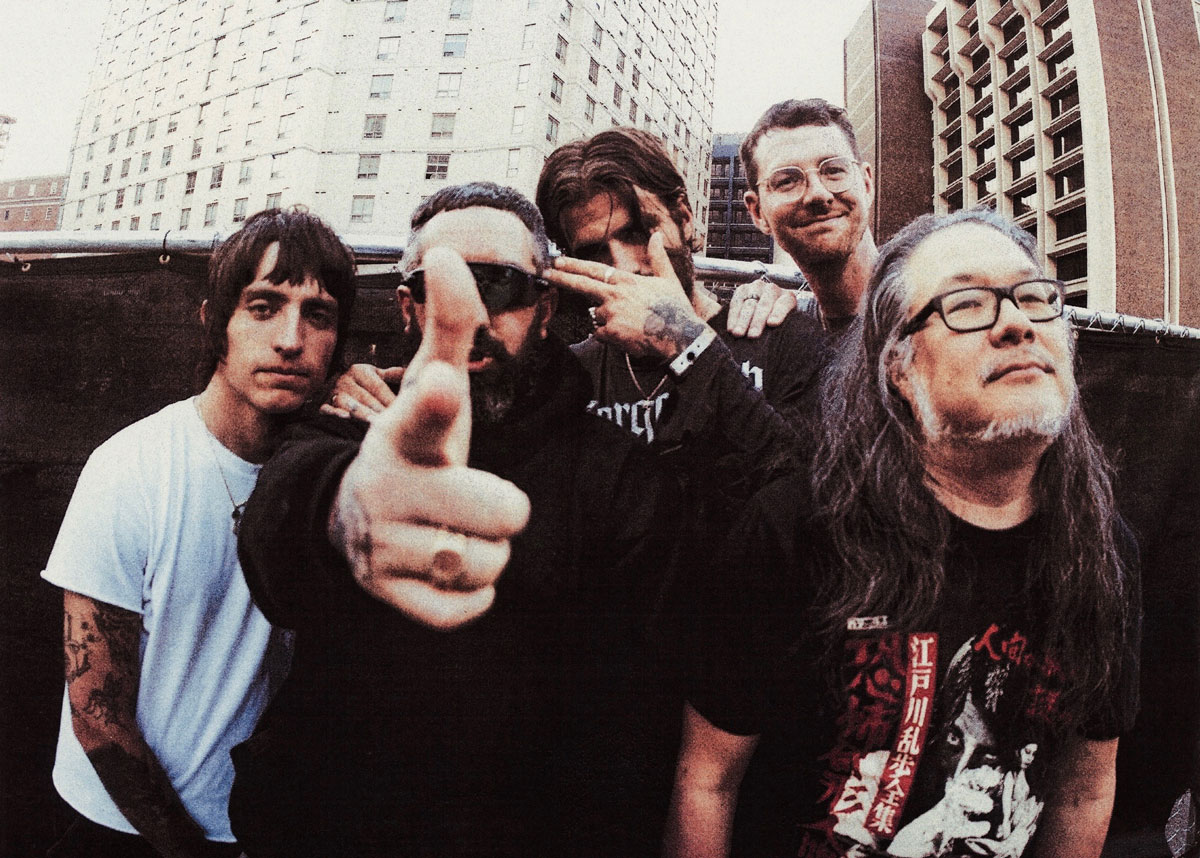NOTHING
ANNOUNCE NEW ALBUM A SHORT HISTORY OF DECAY
DUE OUT 27TH FEBRUARY 2026 VIA RUN FOR COVER
SHARES “CANNIBAL WORLD” VIDEO
PERFORMING AT SLIDE AWAY FESTIVAL

Credit: Luke Ivanovich
Philadelphia shoegaze legends NOTHING announce their new album, a short history of decay. Out 27th February via Run For Cover Records, the band’s fifth studio album stands as their most sonically expansive and emotionally direct work to date: a widescreen reckoning with time, truth, and the body’s slow unraveling.
Recharged by a newly solidified lineup featuring guitarist Doyle Martin (Cloakroom), bassist Bobb Bruno (Best Coast), drummer Zachary Jones (MSC, Manslaughter 777), and guitarist Cam Smith (Ladder To God, Cloakroom), a short history of decay captures frontman Domenic “Nicky” Palermo at his most unflinching, confronting aging, illness, and the weight of memory with startling clarity.
Alongside today’s announcement, NOTHING have shared the album’s first single and video, “cannibal world,” a pulverizing statement of intent that fuses the band’s signature industrial-gaze intensity with the stark vulnerability that characterises their best work.
NOTHING will perform at their own festival, Slide Away, across multiple dates in New York City, Chicago, and Los Angeles. Joined by bands such as Hum, Chapterhouse, Swirlies, and more NOTHING will celebrate the 10th anniversary of their seminal album Tired of Tomorrow with special guest lineups in each market. Tickets are available here.
Slide Away Tour Dates
15th May – Brooklyn, NY @ Brooklyn Paramount
16th May – Brooklyn, NY @ Brooklyn Paramount
23rd May – Chicago, IL @ Aragon Ballroom
29th May – Los Angeles, CA @ Hollywood Palladium
30th May – Los Angeles, CA @ Hollywood Palladium

Album artwork
NOTHING
a short history of decay
27th February 2026 (Run For Cover Records)
1. never come never morning
2. cannibal world
3. a short history of decay
4. the rain don’t care
5. purple strings
6. toothless coal
7. ballet of the traitor
8. nerve scales
9. essential tremors
About NOTHING and a short history of decay:
“We’re not here to do the right thing. We never have been.”
Nothing frontman Domenic “Nicky” Palermo has never described his band in more succinct terms. Nothing have always been rule-breakers. Shoegaze renegades who’ve rebuilt the stereotypically lightweight genre in their own bloody knuckled American image. Outlaw poets spilling existential dread on mile-wide canvasses of fuzz and reverb. Breathing in pain and suffering like oxygen, and exhaling those burdens of survival through a singular outpouring of pulverizing volume and ethereal quietude. Heavy as a thousand tidal waves. Light as ten teardrops.
Beginning as a Philly-born bedroom solo project in 2010, Nothing’s music has always captured the full scale of the human condition, both the blaring anger and the whispering sadness. a short history of decay, Nothing’s fifth solo album and first for Run For Cover Records, widens that aperture even further, providing the most hi-def rendering of Nothing to date. The band have never sounded this colossal, never felt this intimate, never been this honest.
a short history of decay follows Nothing’s 2020 triumph, The Great Dismal, a dark, steely evolution of the world-weary shoegaze sound they codified on their three previous albums: 2018’s Dance on the Blacktop, 2016’s Tired of Tomorrow, and 2014’s Guilty of Everything. At the time of Dismal’s release, Palermo thought the band might’ve reached its natural conclusion, but then life happened and “the feeling of wanting to do it resurfaced,” he explains. With the strongest arsenal in Nothing’s ever-shifting lineup locked in — guitarist Doyle Martin (Cloakroom), bassist Bobb Bruno (Best Coast), drummer Zachary Jones (MSC, Manslaughter 777), and third guitarist Cam Smith (Ladder To God, also of Cloakroom) — singer-songwriter Palermo knew he had the manpower to make the band’s most ambitious record yet.
Ironically, taking a step back is what inspired this step forward. In between touring, making a collaborative post-metal album with Full of Hell (2023’s When No Birds Sang), and launching a multi-generational shoegaze festival called Slide Away, Palermo was able to truly sit still and think for the first time since Nothing began. Without the two-year record cycle chomping at his toes, Nothing’s bandleader spent the last half-decade reading, introspecting, and reflecting on all his band had accomplished — and all he’d personally lost — over the last decade-plus of ear-bleeding debauchery. The highs were certainly soaring: countless tours, collaborations with his heroes in Jesu and Prurient, and writing several records that ended up laying the bedrock for the 2020s shoegaze renaissance.
However, those years of creative prosperity also took a toll on Palermo. Nothing’s touring schedule and sometimes hazardously passionate live shows came with a personal cost: regular ER visits, frayed relationships with friends and family, and excessive substance abuse to cope with not having a grounded home life. Finally being forced to sit and interrogate his own missteps, and consider how going all-in on Nothing swallowed any sense of reality outside of the band, allowed Palermo to develop “somewhat of a clarity” about the passing of time. A clarity that was often more frightening than affirming.
“One of the reasons why I like to tour and love to be busy is that I don’t have to look internally,” Palermo says. “It’s been 10 years and I turn around and I’m in my 40s now. Things have changed, my body’s slowing down. I’m feeling exactly the way that I treated myself the past 12-13 years.”
Palermo’s age has manifested most glaringly with the onset of essential tremors, a neurological disorder similar to Parkinson’s disease that causes the body to shake uncontrollably, both physically and verbally. The non-life-threatening condition runs in Palermo’s family, and while he’s always known it would catch up to him eventually, it’s become undeniably prominent over the last few years. Since Nothing’s last record, the trembles have become subtly audible in his singing voice.
“It’s another thing that just makes you think, ‘my body’s in a decline right now,” he says. “Things are starting to fall apart.”
a short history of decay is, on one level, a documentation of that decline. In a broader sense, it’s a record about truth. Rather than cover up the tremors with reverb, Palermo wanted to leave his own bodily degradation uncharacteristically exposed, a reflection of the radical honesty that encapsulates every sound and lyric on a short history of decay. The record begins with “never come never morning,” a song where Palermo recollects growing up with an abusive father, memories that he’s kept tightly wound throughout Nothing’s career, but that he finally unspools here without any effects to safely obscure the meaning.
“I’m writing about things that I’ve never really talked about before,” Palermo says. “Things I’ve always been scared to write about.”
In “essential tremors,” the other tracklist bookend, Palermo once again murmurs dryly over a spartan chord progression. He’s singing plainly about his disorder, and you can hear it flutter faintly in each breathy utterance. But he’s also singing about the end. About time coming to collect. About the fear of “wrestling with myself” and the anguish of “dissecting the regret.” The song builds to a classic Nothing climax of mangled distortion and bashing drums, but unlike most Nothing tracks where Palermo’s reverb-glazed vocals sound high up in heaven, here, Palermo sounds like he’s sitting right in front of you the whole time. Grinning devilishly at his “favourite fear” with bloodshot eyes and quivering palms.
“Being closer to the end is a strange feeling,” Palermo admits.
a short history of decay doesn’t just take risks lyrically, but musically, too. Nothing’s sound has always run the gamut from glistening piano ballads to scorching fuzz firebombs, but this nine-song opus includes the most achingly pretty and cataclysmically insane songs they’ve ever created. Palermo wrote and co-produced the record in close collaboration with Whirr guitarist Nicholas Bassett, a longtime songwriting partner whose expertise helped elevate a short history of decay to a tier of sonic grandeur that Nothing had never previously achieved.
“Nobody understands what I want to do better than Nick,” Palermo emphasises.
With additional production and mixing work from Sonny Diperri (DIIV, Julie) and every other Nothing member fine-tuning their parts, a short history of decay resulted in the most evolved musical statement in Nothing’s catalogue. “cannibal world” and “toothless coal” build upon the mechanised industrial-gaze of The Great Dismal standout “Say Less.” Clobbering breakbeats — constructed with Jones’ own drum loops — rattle like artillery fire, while miasms of distorted guitar howl into the ether like chainsaw symphonies. It’s the most My Bloody Valentine they’ve ever sounded, but in a way that still feels unequivocally Nothing.
On the other end of the spectrum, the ornately morose “purple strings” boasts a beautiful string arrangement that includes harpist — and two-time Nothing contributor — Mary Lattimore. That baroque delicacy permeates other a short history of decay highlights, particularly “the rain don’t care,” a lilting ballad that channels the worn-down elegance of Mojave 3, and also “nerve scales,” a pattering bop that resembles Radiohead in its marriage of otherworldly atmosphere and mortal precision. “never come never morning” even contains a majestic brass section courtesy of Jesus Ricardo Ayub Chavira, an authentic Corridos musician who Nothing became acquainted with during a long night of partying at Sonic Ranch, the legendary Texas studio where Nothing recorded a short history of decay.
Located on a 1,700-acre pecan orchard just two hours from the Mexican border, Sonic Ranch provided a surreal backdrop for Nothing’s usual itinerary of heavy drinking and thrill-seeking antics. “We were drinking like it was the apocalypse every night — and all day I guess, pretty much,” Palermo says, laughing. Tony Rancich, the eccentric billionaire who owns the studio compound, was an enigmatic presence during the two-week recording process. Palermo says Rancich always had a personal book of spells on hand, and would jog around the studio premises with a 357 magnum strapped to his chest to fend off wild dogs. He allegedly holds the record for the most speeding tickets in Texas, and one night during their marathon bender, he took the Nothing boys on a death-defying 160mph cruise down a desert highway.
Clearly, despite all of Palermo’s reckonings with age and deterioration, Nothing’s rebellious spirit remains intact. Even though, in so many ways, from the personnel changeovers to their advanced sound, Nothing are a vastly different band than they were when they started, Palermo still feels that a short history of decay is an uncannily familiar reflection of Nothing’s briney 2014 debut.
“Between the point of clarity and this overwhelming sense of honesty within myself,” Palermo explains. “This feels like an exact full circle moment to that first record.”
He calls the new record “a final chapter.” Not the end of Nothing, but the conclusion of a story that began with Guilty of Everything — another album about time, regret, and confronting uncomfortable truths — and now resolves with a short history of decay. As much a snapshot of Palermo’s past as it is a leap into Nothing’s future.

